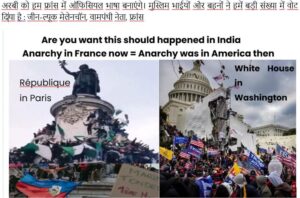
Indian culture has the same place and importance in world history as the sun has in front of innumerable islands. Indian culture is completely different and unique from other cultures. The culture of many countries has been destroyed from time to time, but the Indian culture is still in its existence. In this way, Indian culture is the most ancient in the history of creation, many western scholars have praised and said about the excellence of Indian culture.
Indian philosophy, spiritual thought and education and the messages of those great men, reformers and initiates of the New Age, who were born on the soil of India from time to time, urged people to align their daily practices with the principle of ‘Vasudhaiva Kutumbakam’ for the larger benefit of humanity. requested to be based on. He declared nationalism as the first step of internationalism and exhorted the people to strengthen it with the aim of prosperity and welfare of the whole world. So, India’s concept of nationalism is not narrow, or in that its nature is not intolerant. Those who view Indian nationalism from a narrow perspective or consider it as isolated, should understand its reality. They should go to its roots.
India internationalism either universality Committed country. This commitment is thousands of years old and can be well acknowledged and understood through the ancient slogan of India ‘Vasudhaiva Kutumbakam’. Apart from this, the thousands of years old harmonious and evolutionary Indian culture has also been clearly reiterating its commitment to internationalism through the practices of the Indians who nurtured it.
What is the role of Indian culture when we say Vasudhaivakutumbakam?
G20 Peoples And Parliament building In Ankit aphorisms In Vasudhaiva Kutumbakam Of Glimpse

Parliament is a place where the overall affairs of the nation are discussed and its future is shaped. The critiques of this respectable body are naturally inspired by the highest traditions of truth and piety.
There are many proverbs inscribed in the Parliament House which guide the work of both the Houses and the attention of any visitor cannot remain without being attracted towards them.
A Sanskrit quote is inscribed on the main entrance of the building, which reminds us of the sovereignty of the nation, the tangible symbol of which is the Parliament. The following words are inscribed on door number 1:
Take 3 kaddhaarampava 3 character 33
Pashyem Twan myself Vera 33333
,am 3 Come, 33 sine 3 Yo 3
Come 32111 Iti
,verses, 2/24/8)
Its Hindi translation is: –
,door shell Two, people Of interests,
And showed Two Tableau.
By which hey Receipt Are go,
Sovereign dominance Of.,
,verses, 2/24/8)
After entering the building, you will see the arched outer lobby of the Lok Sabha near Lift No. 1 on the right. Right in the middle of this lobby a door leads to the inner lobby and in front of it a door leads to the central hall where the viewer will see two frescoes.
The door number 1 mural is repeated at the entrance to the inner lobby. This Arabic quote is visible on the dome of the way to the central hall as soon as you turn, which means that people are the creators of their own destiny. That quote is as follows:-
innalaho LA yugyaro mother Become
Hatta yugyaro or bin Nafse Hum.
An Urdu poet has expressed this idea as follows:-
,god has today until that community Of Condition No replaced,
nor Are to whom Care yourself Own Condition change of. ,
The following words are inscribed above the seat of the Speaker inside the Lok Sabha Chamber:-
Dharmachakra,enforcement
,Religion piety Of rotation Of For,
Since the past, the rulers of India have been walking on the path of Dharma considering it as an ideal and the symbol of the same path, the wheel of Dharma is adorned on the national flag and coat of arms of India.
When we move towards the Central Hall from Gate No. 1 of the Parliament House, our attention is drawn to the following Sanskrit verse from the Panchatantra inscribed above the door of that Hall:-
Ayam Nijh Paroveti Calculation Laghuchetsam.
liberal stories you Vasudhaiva Kutumbakam.
,panchatantra 5/38)
The meaning of this verse in Hindi is:-
,This Private, This Feather, think,
shrink thought Is.
gall bladder Of For
Akhil World family Is.,
,panchatantra 5/38)
Other epithets, some inscribed in gold letters, are inscribed on the domes near the lifts. These articles are clearly visible from the first floor of the building.
This verse of Mahabharata is inscribed on the dome near lift number 1:-
nor Like Meeting Yatra nor sage old lady,
old lady nor Te This nor Vadanti Dharmam.
Religion S No Yatra nor satyamasti,
Truth nor Tadyachhalambhupaiti.
,Mahabharata 5/35/58)
Its Hindi translation is as follows:-
,He Meeting No Is in which aged nor be,
they aged No Is that religiously nor say,
Where truth nor Are He Religion No Is,
in which Cheat Are He truth No Is.,
,Mahabharata 5/35/58)
This aphorism and the frescoes of the dome adjacent to lift no. 2 emphasize the two eternal virtues – truth and dharma – that the assembly should follow.
This aphorism is inscribed on the dome adjacent to lift number 2: –
Meeting or nor entrance,
statements or Samanjasam.
abruvan vibruvan return,
Naro Bhavati Kilvishi.
,Manu 8/13)
Its Hindi translation is as follows: –
,any person either So Meeting In enter only nor Do Or If He Like this Do So Him There religiously Speak should, Because nor to speak gonna Or false to speak gonna Human Both only similar Form From Sin Of fled would have Huh.,
This aphorism is inscribed in Sanskrit on the dome adjacent to lift number 3: –
nor vision sanvannam,
Trishu lokeshu Vidyate.
pity friendship f Bhooteshu,
grant f Madhura f speech.
Its Hindi translation is as follows: –
,creatures Feather pity And from them friendship Rate, charity And Madhu Voice, These everyone’s Adjustment One person In all three people In No Get,
The Sanskrit mural inscription on the dome adjacent to lift number 4 also describes the qualities of a good ruler. The mural text is as follows:-
forever, shower Pragya:,
Swamate nor Sometimes
civilized nature,
sabhasatsumate Location:
Its Hindi translation is as follows:-
,ruler Always Intelligent Happen should,
but Him arbitrary ever No Happen should,
Him All things In ministers Of Advice to take should,
Meeting In sit should And good as advised Walking needed.,
Finally, on the dome adjacent to lift number 5, there is this mural in Persian: –
acquitted Ruwake Jabberjad Navishta And birch,
juz Nikoi,a,Ahle Karam nakhwahad Mand.
Its Hindi translation is as follows: –
,This prideful turquoise gem similar building In This golden letter Ankit Huh. Donors Of good errands Of Excessive And any Thing Eternal No Will remain,

Tags: Tags: G 20 Glimpses, Indian culture excellent, Indian nationalism, Inscribed aphorisms, Indian Parliament House, Indian philosophy, Spiritual thought, Vasudhaiva Kutumbakam, Internationalism, Welfare of world, Universalism, Internationalism, Sanskrit quote
By – Premendra Agrawal @premendraind




